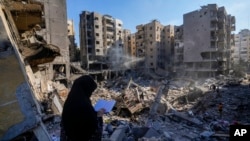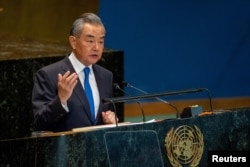As Israel continues to launch airstrikes against Hezbollah targets in Lebanon, China is stepping up its efforts to play the role of peacemaker in the Middle East, issuing statements of condemnation, but Beijing’s actions are also exposing the limits of its ability to de-escalate tensions, analysts say.
“Beijing wants to create an impression that it is pushing for greater peace and stability in the Middle East, but I’m not sure what all the statements amount to,” said Ian Chong, a political scientist at the National University of Singapore.
After Hezbollah confirmed Saturday that its long-time leader Hassan Nasrallah was killed in an Israeli airstrike that took place in the Lebanese capital of Beirut, China's Foreign Ministry reiterated Beijing's concern over the escalating conflict and urged all sides, especially Israel, to take steps to “cool down the situation.”
“China opposes the infringement on Lebanon’s sovereignty and security, opposes and condemns any action against innocent civilians, and opposes any move that fuels antagonism and escalates regional tensions,” a Chinese Foreign Ministry spokesperson said in a statement released Sunday.
The ministry statement added that said since the escalating tension between Israel and Hezbollah is “a spillover of the Gaza conflict,” the priority now is to “implement relevant U.N. Security Council resolutions, end the fighting in Gaza as soon as possible, and earnestly safeguard peace and stability in the Middle East.”
Sunday’s statement follows Chinese Foreign Minister Wang Yi’s meeting with his Lebanese counterpart last Monday on the sidelines of U.N. meetings in New York. During his meeting with Lebanese Foreign Minister Abdallah Bou Habib, Wang also stressed Beijing’s support for Lebanon’s efforts to safeguard its sovereignty and security and called for an immediate cease-fire in Gaza.
In recent months, China has sought to play a bigger role in the Middle East as its trade and diplomatic ties with the region expand.
Earlier in July, Beijing brokered meetings that led to reconciliation between rival Palestinian factions. In March 2023, Beijing helped broker a deal between Saudi Arabia and Iran to reestablish diplomatic ties between the long-time rivals.
Chong said that while brokering the reestablishment of diplomatic ties between Iran and Saudi Arabia and reconciliation between rival Palestinian factions were low-hanging fruits for China, it remains unclear what Beijing may do to tackle more complicated regional issues, such as escalating tension between Israel and Hezbollah.
“It depends on what Beijing is willing to do [regarding the current conflict], and I suppose they could try to lean on Tehran, which they supposedly have good relations with,” he told VOA by phone, adding that it is unclear how far they can get with Iran on issues related to the Middle East.
Leveraging conflict against US
As part of the attempt to present itself as a peacemaker in the Middle East, some observers say China is focusing on depicting Israel and the United States as aggressors in the ongoing conflict while portraying themselves as siding with “the victims.”
“They are painting this narrative that Israel and the U.S. are on the side of injustice and hegemony, and China is on the side of fairness and justice,” Tuvia Gering, a non-resident fellow at Atlantic Council’s Global China Hub, told VOA by phone.
In comments to Chinese state media, some Chinese analysts have argued that it is the U.S. “that allows, tolerates, or even instigates the escalation” of the crisis in the Middle East.
The United States has been pushing for a cease fire between Israel and Hezbollah to avoid further escalation of the conflict and a wider war in the region.
Chong said the ongoing conflict in the Middle East may help to amplify Beijing’s preferred narrative that Washington and its allies are creators of instability, particularly among some developing countries.
“The current situation in the Middle East certainly opens up opportunities for those narratives to perhaps take hold, especially in parts of Africa, Latin America and Asia,” he told VOA.
However, he adds, while China may gain some leverage through this tactic, it needs to put forward something more concrete, such as a tangible peace plan to “capitalize on the sentiment.”
While China seeks to leverage the crisis in the Middle East against the U.S., Chong said the continued escalation of the conflict could also mean more economic pressure for Beijing, as well.
China is the world’s largest importer of oil and after Russia, the Middle East is a key source of energy imports for Beijing to keep its economy running.
“If there is a wider conflict within the Middle East, at a minimum, it may affect energy prices and supplies, which could add to some of China’s ongoing economic woes,” he told VOA.
However, since its primary trading partners in the Middle East are wealthier countries in the Gulf Cooperation Council and Iran, accounting for more than $300 billion in 2023 in exports and imports, some experts say the impact of the ongoing conflict on China’s economic interests is likely to be limited.
“I would imagine the current situation is very worrying for China and many other countries, but so long as the conflict is primarily limited to Israel dealing with different proxies and militias in its immediate surroundings, I don’t necessarily think that it would translate into a direct threat of Chinese interests,” Mohammed Alsudairi, a lecturer in politics and international relations at the Australian National University, told VOA in a phone interview.







